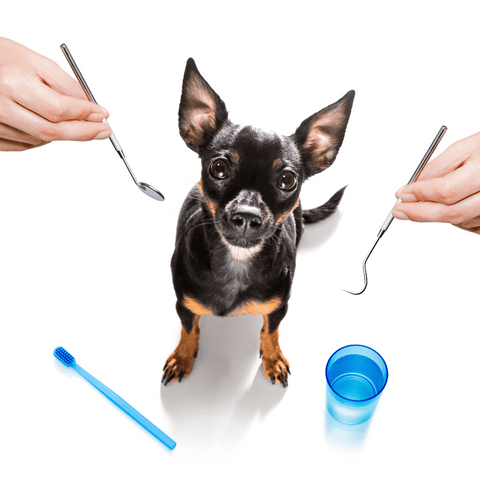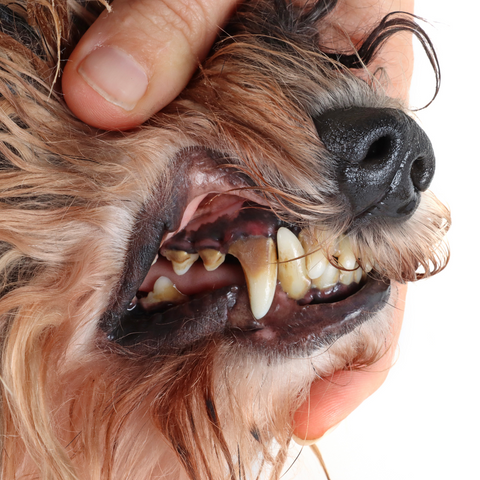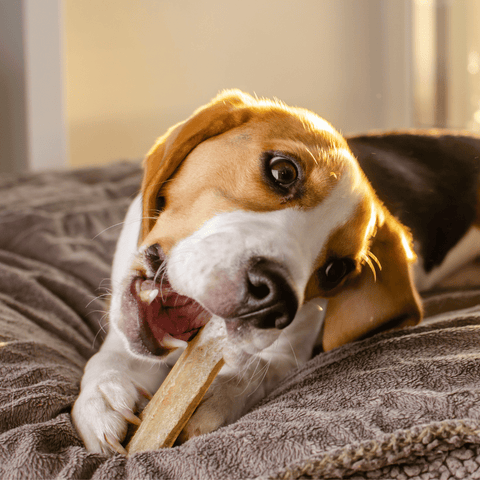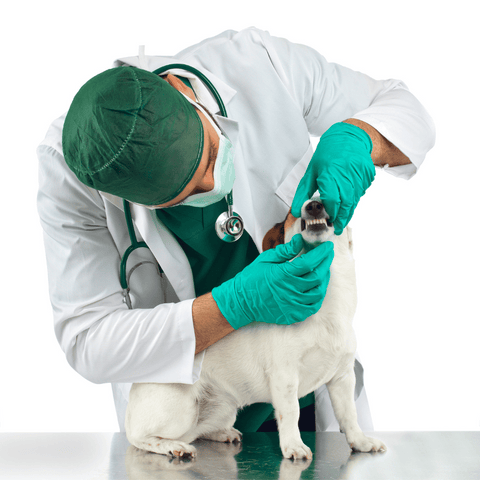
Dental Health for Dogs: Why it Matters and How to Maintain it
Dental Health for Dogs: Why it Matters and How to Maintain it
Just like humans, dogs also need proper dental care to maintain their overall health. Neglecting your dog's teeth can lead to serious health problems and even shorten their lifespan. According to recent studies, almost 90% of dogs will have developed some form of periodontal disease by 2 years of age. In this blog post, we'll go over the importance of dental health for dogs, common dental problems, and tips for maintaining your dog's dental hygiene.

Why is dental health important for dogs?
Dental health is an essential aspect of your dog's overall health. Poor oral hygiene can lead to plaque buildup, which can cause inflammation of the gums (gingivitis) and tooth decay. This can cause severe pain and discomfort for your dog and can even spread to their internal organs, such as the heart and kidneys. Regular dental check-ups and cleanings are important to prevent these problems and to maintain good oral hygiene.
Common dental problems in dogs

- Tartar buildup: Tartar is a hard, yellowish substance that forms on your dog's teeth, particularly along the gum line. Tartar buildup can lead to gum disease and tooth decay.
- Tooth decay: Tooth decay is caused by the bacterial buildup of plaque and tartar on your dog's teeth. It can cause severe pain and discomfort, and in some cases, can lead to tooth loss.
- Gum disease: Gum disease is an inflammation of the gums caused by plaque buildup. It can cause severe pain, bleeding gums, and tooth loss.
- Tooth fractures: Tooth fractures are common in dogs that chew on hard objects, such as bones or toys. Fractured teeth can cause severe pain and discomfort, and in some cases, can lead to infection.
Signs of Dental Issues
Some signs of dental health problems include:
- Bad breath
- Yellow or brown buildup on teeth
- Loss of appetite or difficulty eating
- Pawing at the face or mouth
- Redness or swelling in the mouth
- Drooling or drooling more than usual
- Loose or missing teeth
- Bloody saliva or excessive drooling
- Decreased interest in playing or chewing toys
- Recurrent infections of the mouth or nose
Tips for maintaining your dog's dental hygiene
Brush your dog's teeth regularly
Brushing your dog's teeth regularly with a toothbrush and toothpaste specifically designed for dogs is the best way to prevent plaque buildup and maintain good oral hygiene.
How to Brush Your Dog's Teeth
- Start slow: Introduce your dog to the idea of having their teeth brushed gradually. Begin by simply letting them smell and lick the toothpaste, then progress to letting them nibble on the toothbrush.
- Find the right toothbrush: Look for a toothbrush specifically designed for dogs. They have softer bristles and a larger head to accommodate a dog's mouth.
- Choose the right time: Brush your dog's teeth at a time when they are calm and relaxed.
- Lift the lip: Lift your dog's lip to expose their teeth and gums. Be gentle so as not to scare them.
- Brush in circular motions: Use gentle, circular motions to brush the outside of your dog's teeth and gums. Make sure to brush the back teeth as well.
- Reward your dog: After brushing, give your dog a treat or some praise to make the experience positive.
- As with all new things, it may take some time for your dog to get used to having their teeth brushed. If your dog is resistant, be patient and try again later.
DIY Toothpaste Recipes
Never use a toothpaste made for humans for your dog, many of them contain ingredients that are toxic to dogs such as xylitol. Here are are some DIY toothpaste recipes you can make at home. Note: Although safe to swallow, it's important to supervise your dog while brushing their teeth to prevent them from licking the paste.
Coconut Oil Toothpaste
Ingredients:
• 2 tablespoons of coconut oil
• 2 tablespoons of baking soda
• 2-3 drops of peppermint essential oil
Instructions:
1. Mix the coconut oil and baking soda in a small bowl.
2. Stir in the peppermint essential oil.
3. Store the paste in a clean, airtight container and use as needed.
Chicken Broth Toothpaste
Ingredients:
• 2 tablespoons of chicken broth
• 2 tablespoons of baking soda
• 1 teaspoon of dried parsley
Instructions:
1. Mix the chicken broth and baking soda in a small bowl.
2. Stir in the dried parsley.
3. Store the paste in a clean, airtight container and use as needed.
Clove Toothpaste
Ingredients:
• 2 tablespoons of baking soda
• 1 tablespoon of salt
• 1 tablespoon of water
• 2-3 drops of clove oil
Instructions:
1. Mix the baking soda and salt in a small bowl.
2. Gradually add water and stir until you have a smooth paste.
3. A the clove oil and mix thoroughly.
4. Store the paste in a clean, airtight container and use as needed.
Provide chews for your dog

Chew toys can help remove plaque and tartar from your dog's teeth and massage their gums.
Natural Dog Chews Healthy for Teeth
- Antlers: Antlers are a long-lasting chew that can help clean teeth and freshen breath. They are also a great source of calcium and other minerals.
- Bully sticks: Bully sticks are a natural, protein-rich chew that can help clean teeth and freshen breath. They come in a variety of sizes, so be sure to choose one that is appropriate for your dog's size.
- Goat horns: Goat horns are great for cleaning your dog’s teeth because they scrape away tartar build-up from the surface of their teeth.
- Dried animal ears: Dried ear, such as rabbit, kangaroo or cow ears, complete with fur help promote good digestion and teeth cleaning.
- Air-dried chews: Air-dried chews are a natural and healthy option for cleaning teeth and freshening breath. Just be sure to choose a brand that is made without preservatives or artificial flavors.
Feed your dog a balanced diet
Feeding your dog a balanced, species appropriate raw diet, with the proper amount of vitamins and minerals can help maintain their dental health. Addition of probiotics to the diet provide oral health benefits by reducing inflammation and bad bacteria that lead to periodontal disease.
Natural Treats for Cleaning Dogs Teeth
- Raw bones: Raw bones, such as chicken or beef bones, are great for cleaning teeth and massaging gums. Just make sure to choose bones that are appropriate for your dog's size and avoid bones that splinter easily. Never feed your dog cooked bones.
- Carrots: Carrots are crunchy and low in fat, making them a great option for cleaning teeth and freshening breath.
- Apple slices: Apples are crunchy and high in fiber, helping to remove plaque and tartar from teeth. Just be sure to remove the seeds and core before giving to your dog.
- Green beans: Green beans are crunchy and low in calories, making them a great option for dogs who need to lose weight. They also help clean teeth and freshen breath.
- Sweet potatoes: Sweet potatoes are high in vitamins and minerals and are great for cleaning teeth. They can be served raw or cooked.
- Cucumber slices: Cucumbers are low in calories and high in water content, making them a great option for freshening breath and cleaning teeth.
Regular dental check-ups

Regular dental check-ups with your veterinarian can help prevent and detect dental problems early. During a dental health check, the will carry out a thorough examination of your dog’s mouth, teeth, and gums to determine if there are any signs of gingivitis, plaque build-up or infection. If necessary, the vet may recommend a scale and polish. This is often done under general anesthetic, so if your dog is ever going under anesthetic for another procedure this may be a good opportunity to get their teeth cleaned at the same time.
Conclusion
In conclusion, incorporating natural chews and treats into your dog's diet, along with brushing their teeth regularly with a toothpaste designed for dogs, can help maintain their dental health and prevent serious dental problems. As with all treats, it's important to give them in moderation and to always supervise your dog while they are chewing to prevent choking, be sure to always choose chews that are appropriate for your dog's size. Regular check-ups with a veterinarian are also essential for maintaining good oral hygiene for your furry friend.
